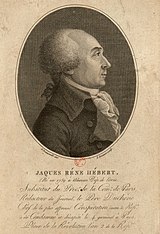Jacques Hébert
| Jacques Hébert | |
|---|---|
 |
|
| Deputy of the National Convention | |
|
In office 20 September 1792 – 23 March 1794 |
|
| Personal details | |
| Born |
Jacques René Hébert November 15, 1757 Alençon, France |
| Died | 24 March 1794 (aged 36) Paris, France |
| Cause of death | Guillotine |
| Nationality | French |
| Political party |
Jacobin Club (1789-1792) Cordeliers Club (1792-1794) |
| Other political affiliations |
The Mountain (1792-1794) |
| Spouse(s) | Marie Marguerite Françoise Hébert (m. 1792) |
| Children | Scipion-Virginia Hébert (1793-1830) |
| Parents | Jacques Hébert (?-1766) and Marguerite La Beunaiche de Houdré (1727-1787) |
| Residence | Paris, France |
| Occupation | Journalist, writer, publisher, politician |
| Signature |  |
Jacques René Hébert (French: [ebɛʁ]; 15 November 1757 – 24 March 1794) was a French journalist, and the founder and editor of the extreme radical newspaper Le Père Duchesne during the French Revolution. He was a leader of the French Revolution and had thousands of followers as the Hébertists or the Hébertistes; he himself is sometimes called Père Duchesne, after his newspaper.
He was born on 15 November 1757 at Alençon, to goldsmith, former trial judge, and deputy consul Jacques Hébert (died 1766) and Marguerite Beunaiche de Houdrie (1727–1787). Jacques-René Hébert studied law at the College of Alençon and went into practice as a clerk in a solicitor of Alençon, at which time he was ruined by a lawsuit against a Dr. Clouet. Hébert fled first to Rouen and then to Paris. For a while he passed through a difficult financial time and lived through the support of a hairdresser in rue des Noyers. There he found work in a theater, la République, where he wrote plays in his spare time, but these were never produced. He was fired for stealing. He then entered the service of a doctor. It is said he lived through expediency and scams.
In 1789, he began his writing with a pamphlet "la Lanterne magique ou le Fléau des Aristocrates" (Magic Lantern, or Scourge of Aristocrats). He published a few booklets. In 1790, he attracted attention through a pamphlet he published, and became a prominent member of the club of the Cordeliers in 1791.
From 1790 until his death in 1794 Hébert became a voice for the working class of Paris through his highly successful and influential journal, Le Père Duchesne. In his journal, Hébert assumed the voice of a patriotic sans-culotte named Père Duchesne and would write first-person narratives in which Père Duchesne would often relay fictitious conversations that he had with the French monarchs or government officials. These stories encouraged violent behaviors and utilized foul language, however, Père Duchesne's stories were also witty, reflective, and resonated deeply with Parisian workers. Street hawkers would yell: Il est bougrement en colère aujourd’hui le père Duchesne! (Father Duchesne is very angry today!).
...
Wikipedia
